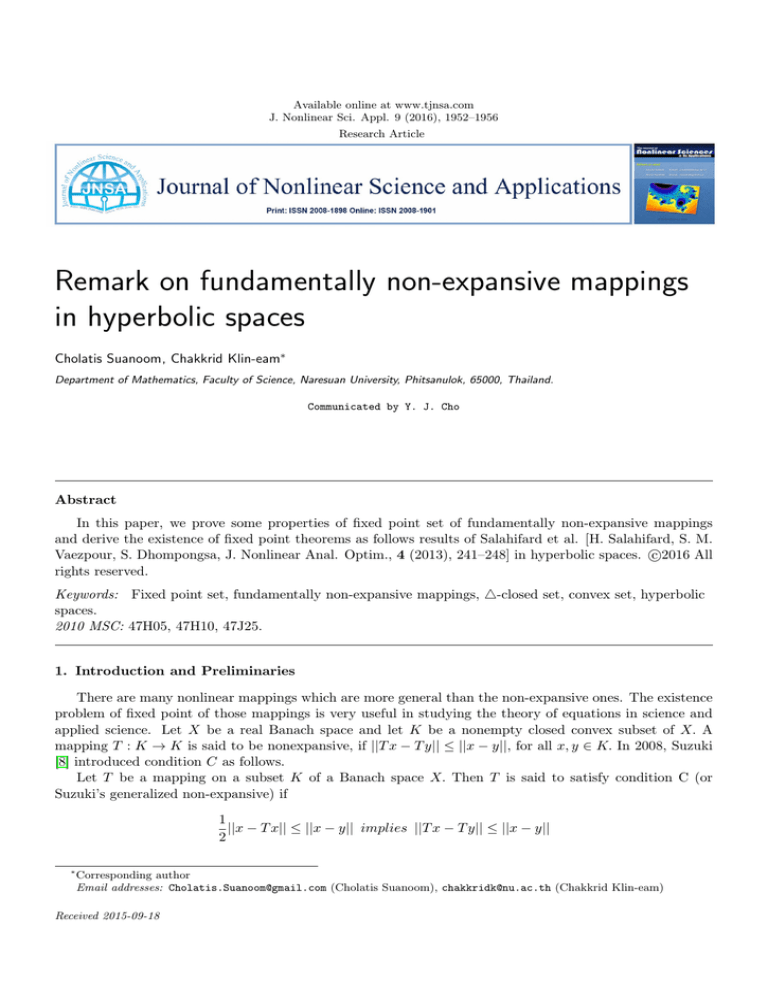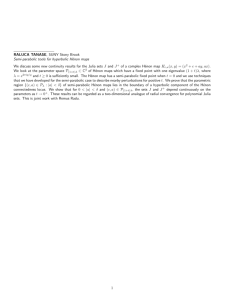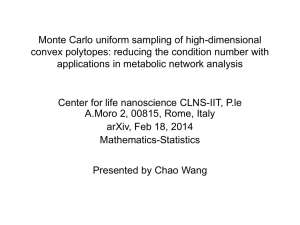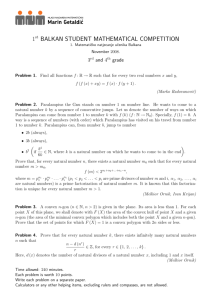
Available online at www.tjnsa.com
J. Nonlinear Sci. Appl. 9 (2016), 1952–1956
Research Article
Remark on fundamentally non-expansive mappings
in hyperbolic spaces
Cholatis Suanoom, Chakkrid Klin-eam∗
Department of Mathematics, Faculty of Science, Naresuan University, Phitsanulok, 65000, Thailand.
Communicated by Y. J. Cho
Abstract
In this paper, we prove some properties of fixed point set of fundamentally non-expansive mappings
and derive the existence of fixed point theorems as follows results of Salahifard et al. [H. Salahifard, S. M.
c
Vaezpour, S. Dhompongsa, J. Nonlinear Anal. Optim., 4 (2013), 241–248] in hyperbolic spaces. 2016
All
rights reserved.
Keywords: Fixed point set, fundamentally non-expansive mappings, 4-closed set, convex set, hyperbolic
spaces.
2010 MSC: 47H05, 47H10, 47J25.
1. Introduction and Preliminaries
There are many nonlinear mappings which are more general than the non-expansive ones. The existence
problem of fixed point of those mappings is very useful in studying the theory of equations in science and
applied science. Let X be a real Banach space and let K be a nonempty closed convex subset of X. A
mapping T : K → K is said to be nonexpansive, if ||T x − T y|| ≤ ||x − y||, for all x, y ∈ K. In 2008, Suzuki
[8] introduced condition C as follows.
Let T be a mapping on a subset K of a Banach space X. Then T is said to satisfy condition C (or
Suzuki’s generalized non-expansive) if
1
||x − T x|| ≤ ||x − y|| implies ||T x − T y|| ≤ ||x − y||
2
∗
Corresponding author
Email addresses: Cholatis.Suanoom@gmail.com (Cholatis Suanoom), chakkridk@nu.ac.th (Chakkrid Klin-eam)
Received 2015-09-18
C. Suanoom, C. Klin-eam, J. Nonlinear Sci. Appl. 9 (2016), 1952–1956
1953
for all x, y ∈ K.
It is obvious that every non-expansive mapping satisfies condition C, but the converse is not true. The next
simple example can show this fact.
Example 1.1 ([2]). Define a mapping T on [0, 3] by
0 x 6= 3,
Tx =
1 x = 3.
Then T satisfies condition C, but T is not non-expansive.
In 2014, Ghoncheh and Razani [2], introduced the following definition and recalled some other conditions
which generalize the Suzuki and studied fixed point for some generalized non-expansive mappings in Ptolemy
spaces as follows.
Let X be a metric space and K be a subset of X. A mapping T : K → K is said to be fundamentally
non-expansive if
d(T 2 x, T y) ≤ d(T x, y)
(1.1)
for all x, y ∈ K.
Proposition 1.2. Every mapping which satisfies condition C is fundamentally non-expansive, but the converse is not true.
Example 1.3. Suppose X = {(0, 0), (0, 1), (1, 1), (1, 2)}. Define
d((x1 , y1 ), (x2 , y2 )) = max{|x1 − x2 |, |y1 − y2 |}.
Define T on X by T (0, 0) = (1, 2), T (0, 1) = (0, 0), T (1, 1) = (1, 1), T (1, 2) = (0, 1).
Then T is fundamentally nonexpansive, but T dose not satisfy condition C.
In 2013, Salahifard et al. [7], introduced the fundamentally non-expansive mappings in complete CAT (0)
space and proved for some theorems as follows,
Theorem 1.4. Let K be a bounded closed convex subset of complete CAT (0) space X. Let T : K → K be
fundamentally non-expansive and F (T ) 6= ∅, then F (T ) is 4-closed and convex.
Throughout this paper, we work in the setting of hyperbolic spaces introduced by Kohlenbach [3]. A
hyperbolic space is a metric space (X, d) with a mapping W : X 2 × [0, 1] → X satisfying the following
conditions.
(i) d(u, W (x, y, α)) ≤ (1 − α)d(u, x) + αd(u, y);
(ii) d(W (x, y, α), W (x, y, β)) = |α − β|d(x, y);
(iii) W (x, y, α) = W (y, x, 1 − α);
(iv) d(W (x, z, α), W (y, w, α)) ≤ (1 − α)d(x, y) + αd(z, w)
for all x, y, z, w ∈ X and α, β ∈ [0, 1].
Example 1.5. Let X be a real Banach space which is equipped with norm || · ||. Define the function
d : X 2 → [0, ∞) by
d(x, y) = ||x − y||
as a meter on X. Let K be a nonempty bounded closed convex subset of Banach space. We see that (X, d)
is a hyperbolic space with mapping W : X 2 × [0, 1] → X which is defined by
W (x, y, α) = (1 − α)x + αy.
C. Suanoom, C. Klin-eam, J. Nonlinear Sci. Appl. 9 (2016), 1952–1956
1954
Definition 1.6 ([3],[4],[6]). Let X be a hyperbolic space with a mapping W : X 2 × [0, 1] → X.
(i) A nonempty subset K ⊆ X is said to be convex, if W (x, y, α) ∈ K for all x, y ∈ K and α ∈ [0, 1].
(ii) A hyperbolic space is said to be uniformly convex if for any r > 0 and ∈ (0, 2], there exists a δ ∈ (0, 1]
such that for all u, x, y ∈ X
1
d(W (x, y, ), u) ≤ (1 − δ)r,
2
provided d(x, u) ≤ r, d(y, u) ≤ r and d(x, y) ≥ r.
(iii) A map η : (0, ∞) × (0, 2] → (0, 1] which provides such a δ = η(r, ) for given r > 0 and ∈ (0, 2], is
known as a modulus of uniform convexity of X. η is said to be monotone, if it decreases with r (for a
fixed ), i.e., ∀ > 0, ∀r1 ≥ r2 > 0 [η(r2 , ) ≤ η(r1 , )].
Definition 1.7. Let (X, d) be a metric space and let K be a nonempty subset of X. We shall denote the
fixed point set of a mapping T by F (T ) = {x ∈ K : T x = x}.
Definition 1.8. Let {xn } be a bounded sequence in a hyperbolic space (X, d). For x ∈ X, we define a
continuous functional r(·, xn ) : X → [0, ∞) by
r(x, xn ) = lim sup d(x, xn ).
n→∞
The asymptotic radius r({xn }) of {xn } is given by
r({xn }) = inf{r(x, xn ) : x ∈ X}.
The asymptotic center AK ({xn }) of a bounded sequence {xn } with respect to K ⊆ X is the set
AK ({xn }) = {x ∈ X : r(x, xn ) ≤ r(y, xn ), ∀y ∈ K}.
This implies that the asymptotic center is the set of minimizer of the functional r(·, xn ) in K. If the
asymptotic center is taken with respect to X, then it is simply denoted by AK ({xn }). It is known that
uniformly convex Banach spaces and CAT(0) spaces enjoy the property that bounded sequences have unique
asymptotic centers with respect to closed convex subsets.
Lemma 1.9 ([1],[5]). Let (X, d, W ) be a complete uniformly convex hyperbolic space with monotone modulus
of uniform convexity η. Then every bounded sequence {xn } in K has a unique asymptotic center in K.
Lemma 1.10 ([1]). Let {an }, {bn } and {δn } be sequences of nonnegative real numbers satisfying
an+1 ≤ (1 + δn )an + bn ,
∀n > 1.
(1.2)
∞
If Σ∞
n=1 δn < ∞ and Σn=1 bn < ∞, then limn→∞ an exists.
If there exists a subsequence {ani } ⊂ {an } such that ani → 0, then limn→∞ an = 0.
Lemma 1.11 ([1]). Let (X, d, W ) be a uniformly convex hyperbolic space with monotone modulus of uniform
convexity η. Let x ∈ X and {αn } be a sequence in [a, b] for some a, b ∈ (0, 1). If {xn } and {yn } are sequences
in X such that
lim sup d(xn , x) ≤ c, lim sup d(yn , x) ≤ c and lim sup d(W (xn , yn , αn ), x) = c
n→∞
n→∞
n→∞
for some c ≥ 0. Then limn→∞ d(xn , yn ) = 0.
In this paper, we prove some properties of the fixed point set of fundamentally non-expansive mappings
and derive the existence of fixed point theorems as follows results of Salahifard et al. [7] in hyperbolic spaces.
C. Suanoom, C. Klin-eam, J. Nonlinear Sci. Appl. 9 (2016), 1952–1956
1955
2. Main results
In this section, we shall prove some lemmas for fundamentally non-expansive mappings in a hyperbolic space.
Definition 2.1. Let X be a hyperbolic space and K be a nonempty bounded closed strictly convex subset
of X. A mapping T : K → K is said to be fundamentally non-expansive if
d(T 2 x, T y) ≤ d(T x, y)
(2.1)
for all x, y ∈ K.
Lemma 2.2. Let K be a nonempty bounded closed strictly convex subset of complete hyperbolic space X.
Let T : K → K be fundamentally non-expansive and F (T ) 6= ∅, then F (T ) is 4-closed and convex.
Proof. Suppose that {xn } is a sequence in F (T ) which 4-converges to some y ∈ K. To show that y ∈ F (T ),
we write
d(xn , T y) = d(T 2 xn , T y) ≤ d(T xn , y) = d(xn , y),
thus
lim sup d(xn , T y) ≤ lim sup d(xn , y).
n→∞
n→∞
By the uniqueness of asymptotic center, we get T y = y. Hence F (T ) is closed.
Next, we will show that F (T ) is convex. Let x, y ∈ F (T ) and each α ∈ [0, 1]. Then,
d(x, T z) = d(T 2 x, T z) ≤ d(T x, z) = d(x, z)
and
d(y, T z) = d(T 2 y, T z) ≤ d(T y, z) = d(y, z).
For z = W (x, y, α), we have
d(x, y) ≤ d(x, T z) + d(T z, y)
≤ d(x, z) + d(z, y)
= d(x, W (x, y, α)) + d(W (x, y, α), y)
≤ (1 − α)d(x, x) + αd(x, y) + (1 − α)d(x, y) + αd(y, y)
= d(x, y).
(2.2)
Thus d(x, T z) = d(x, z) and d(T z, y) = d(z, y), because if d(x, T z) < d(x, z) or d(T z, y) < d(z, y), then which
the contradiction to d(x, y) < d(x, y), therefore T z = W (x, y, α) and T z = z, and then W (x, y, α) ∈ F (T ).
Hence F (T ) is convex.
Lemma 2.3. Let K be a nonempty bounded closed subset of complete uniformly convex hyperbolic space X
with monotone modulus of uniform convexity η. Let T : K → K be fundamentally non-expansive, then F (T )
is nonempty.
Proof. By Lemma 1.9, the asymptotic center of any bounded sequence is in K, particularly, the asymptotic
center of approximate fixed point sequence for T is in K. Let A({xn }) = {y}, we want to show that y is a
fixed point of T. We can consider
d(xn , T y) ≤ d(T 2 xn , T y) ≤ d(T xn , y) = d(xn , y),
hence
lim sup d(xn , T y) ≤ lim sup d(xn , y).
n→∞
By the uniqueness of the asymptotic center T y = y.
n→∞
C. Suanoom, C. Klin-eam, J. Nonlinear Sci. Appl. 9 (2016), 1952–1956
1956
Theorem 2.4. Let K be a nonempty bounded closed strictly convex subset of complete uniformly convex
hyperbolic space X with monotone modulus of uniform convexity η. Let T : K → K be fundamentally
non-expansive, then F (T ) is nonempty 4-closed and convex.
Proof. By Lemmas 2.2 and 2.3, we get that F (T ) is nonempty 4-closed and convex.
Acknowledgements
The authors would like to thank Science Achievement Scholarship of Thailand, which provides funding
for research.
References
[1] S. Chang, G. Wang, L. Wang, Y. K. Tang, Z. L. Zhao, ∆-convergence theorems for multi-valued nonexpansive
mappings in hyperbolic spaces, Appl. Math. Comput., 249 (2014), 535–540. 1.9, 1.10, 1.11
[2] S. J. H. Ghoncheh, A. Razani, Fixed point theorems for some generalized nonexpansive mappings in Ptolemy
spaces, Fixed Point Theory Appl., 2014 (2014), 11 pages. 1.1, 1
[3] U. Kohlenbach, Some logical metatheorems with applications in functional analysis, Trans. Amer. Math. Soc.,
357 (2005), 89–128. 1, 1.6
[4] L. Leustean, A quadratic rate of asymptotic regularity for CAT (0)-spaces, J. Math. Anal. Appl., 325 (2007),
386–399. 1.6
[5] L. Leustean, Nonexpansive iterations in uniformly convex W-hyperbolic spaces, Nonlinear Anal. Optim., 513
(2010), 193–209. 1.9
[6] T. C. Lim, Remarks on some fixed point theorems, Proc. Am. Math. Soc., 60 (1976), 179–182. 1.6
[7] H. Salahifard, S. M. Vaezpour, S. Dhompongsa, Fixed point theorems for some generalized nonexpansive mappings
in CAT (0) spaces, J. Nonlinear Anal. Optim., 4 (2013), 241–248. 1, 1
[8] T. Suzuki, Fixed point theorems and convergence theorems for some generalized nonexpansive mappings, J. Math.
Anal. Appl., 340 (2008), 1088–1095. 1




